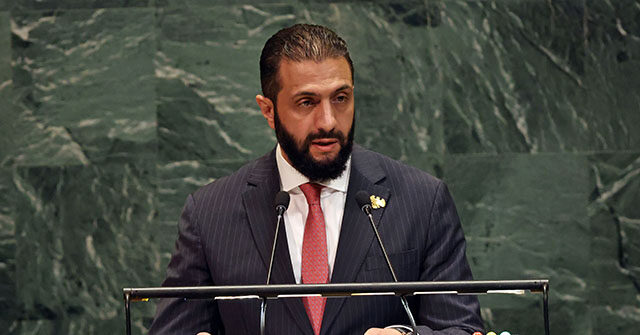Syria’s interim president Ahmed al-Sharaa gave one of the shortest addresses to the U.N. General Assembly on Tuesday.
Sharaa condemned the regime of Bashar Assad, which his forces overthrew in December after a gruesome 14-year civil war, and asked the international community for help with rebuilding Syria after that devastating conflict. Sharaa was the first Syrian leader to address the General Assembly in six decades.
Unsurprisingly, Sharaa did not address the controversy over his origins as a leader of the al-Qaeda terrorist organization. The early part of his speech was devoted to extolling the natural beauty of Syria and the strength of its people, while condemning the horrors of the previous regime, implicitly suggesting that Sharaa’s actions were justified by the desperate struggle to remove a monstrous dictator.
“The Syrian story is a story of the struggle between good and evil,” he said, casting the Syrian insurgency as a righteous force that had “no supporter except God” for much of the civil war.
Sharaa hailed the Syrian capital of Damascus as “the capital of history and the cradle of civilizations” and praised Syria as “a beautiful country that has taught the world the meaning of civilization, and the value of human beings, and coexistence.”
“Syria, however, for sixty years fell under a repressive rule that disregarded the value of the territory it ruled over,” he said. “For long years we suffered injustice, and deprivation, and oppression.”
“The previous regime used the worst kind of torture against our people — chemical weapons, and bombardment, and torture, and prison, and displacement, and sectarian strife,” he said. “The former regime killed around a million innocent people and displaced millions, demolished two million homes. Unarmed people were attacked using chemical weapons. Our women and children have inhaled toxic gases.”
Shara was proud of the military operation that finally ousted Bashar Assad from Damascus, describing it as “merciful” and emphasizing that it “did not target civilians.” He said the goal was to obtain “justice without vengeance.”
With Assad gone, Sharaa said Syria has “transformed from an exporter of crisis to an opportunity for peace.” He touted a crackdown on Syria’s illegal drug trade as one of many benefits to the region and the world.
Sharaa said Syrians would now stand united, resisting all efforts to divide them into warring factions, and pledged that his government would show “tolerance” to Syria’s many factions and religions. Without discussing recent outbreaks of factional violence in detail, he promised to work with international “fact-finding missions” and guaranteed he would fully investigate reports of persecution.
Sharaa proceeded to complain at length about Israeli airstrikes on Syrian territory – some of which were conducted to prevent the kind of persecution he promised not to tolerate. He said he was “committed to dialogue” with Israel to resolve security concerns, and expressed his support for the Separation of Forces Agreement of 1974, which created safe distance between Syrian and Israeli forces following the Yom Kippur War in 1973.
The U.N. has also called for a return to the map laid out by the 1974 treaty, which would require Israel to withdraw its forces from a demilitarized zone around the Golan Heights. Israeli Prime Minister Benjamin Netanyahu argued in December that the fall of the Assad regime nullified the Separation of Forces agreement, which Syrian soldiers had been violating. Syria and Israel have been negotiating a security agreement that could resolve Israel’s concerns about attacks emanating from the area covered by the 1974 agreement.
Sharaa called on the international community to stand beside Syria in the face of Israeli strikes, and to lift sanctions imposed against the defunct Assad regime, so that Syria could reassert its sovereignty and make progress on postwar reconstruction. He promised to build an “inclusive” Syrian government and legislature that international agencies and investors could trust.
“We call now for the complete lifting of sanctions, so that they no longer shackle the Syrian people,” he said. “Investment laws have been amended, and major regional and international companies have already begun entering the Syrian market, contributing through investment and reconstruction.”
“We are determined to restore Syria’s glory, dignity, and honor,” he said. “Syria is reclaiming its rightful place among the nations of the world.”
Sharaa offered thanks to the nations that have stood by Syria since the fall of Assad, and those which took in Syrian refugees during the civil war, including Turkey, Qatar, Saudi Arabia, all “Arab and Islamic states,” as well as the United States of America and the European Union.
Sharaa concluded his speech by declaring Syria “stands firmly with the people of Gaza,” a line that brought applause from parts of the General Assembly.
“We call for an immediate end to the war,” he said.
Read the full article here
